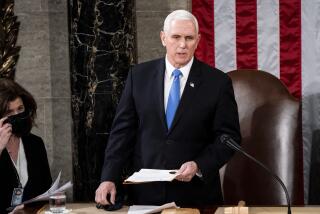Judges Raise Doubts on Excusing Secret Service in Probe
- Share via
WASHINGTON — Three federal appeals court judges were skeptical Friday about the Justice Department’s attempt to excuse Secret Service employees from testifying in the Monica S. Lewinsky investigation of what they or others saw or heard while protecting President Clinton.
Judge Douglas H. Ginsburg went so far as to characterize as “bizarre” an element of Justice attorney Stephen W. Preston’s argument in asserting legal privilege for Secret Service officials.
The critical remarks seemed to boost independent counsel Kenneth W. Starr’s prosecutors, who believe that the agents have important firsthand information about Lewinsky’s relationship with Clinton.
Meanwhile, Lewinsky returned to California on Friday to spend several days with her father, Brentwood oncologist Bernard Lewinsky. According to a lawyer familiar with the case, there is no sign of an agreement between Lewinsky’s new lawyers and Starr’s office that could lead to her testifying in the case.
Preston told Ginsburg and Judges Stephen F. Williams and A. Raymond Randolph, two of his colleagues on the U.S. Circuit Court of Appeals here, that what is at stake is the highest possible “public good . . . , protecting the life of the president.”
“This case is about the safety of the president and what is necessary in the judgment of the Secret Service to protect him from assassination,” Preston said. Unless presidents are confident that their bodyguards will not be required to testify about what they learn while in “close proximity,” they are likely to “push away” their protectors, he added.
Starr, however, argued that “there have been revelations by Secret Service” officials of less than admirable conduct by former presidents with “no evidence” that this led presidents to push agents away.
At issue is a May 22 order by Chief U.S. District Judge Norma Holloway Johnson requiring two Secret Service officers and a Secret Service attorney to testify before a federal grand jury. That panel is collecting evidence in Starr’s investigation of whether Clinton, Lewinsky or others suborned perjury, obstructed justice, intimidated witnesses or otherwise violated federal law in connection with Paula Corbin Jones’ sexual harassment suit against Clinton, which has since been dismissed.
The Secret Service testimony could be crucial to Starr’s effort to corroborate taped telephone conversations in which Lewinsky allegedly describes a sexual affair with Clinton. But even if the judges uphold Johnson’s ruling, a possible Justice Department appeal of the decision to the Supreme Court could further delay any Secret Service testimony. The justices probably would not decide whether to hear the case until October, when their next term begins.
As soon as Preston finished outlining the importance of the Secret Service privilege issue, Williams pressed him on what has been a sensitive point for the White House: “Whose privilege is it?”
The White House has repeatedly emphasized that it is the Secret Service and the Treasury Department that are asserting the privilege, not the president. This avoids the appearance of Clinton trying to “stonewall” by blocking possibly crucial testimony.
Preston said the privilege is the Treasury secretary’s to invoke, not the president’s. The Secret Service is part of the Treasury Department and was being represented at the hearing by the Justice Department.
Williams said that this made the privilege “rare, unique” and “rather frail” because the privilege “is not held by the person,” meaning the president, whose behavior the Secret Service argues would be affected by it.
Most of the judges’ questions for Preston appeared to challenge the central tenets of the privilege argument, while those to Starr were more peripheral.
The judges gave no indication at the end of the 65-minute argument as to when they might reach a decision in the case.
In a related matter, Atty. Gen. Janet Reno on Friday disclosed the Justice Department’s position on the question of whether longtime Clinton aide and White House Deputy Counsel Bruce R. Lindsey, who has invoked attorney-client privilege, should be required to answer questions from the grand jury.
Submitting a friend-of-the-court brief in the attorney-client privilege dispute, which will be argued Monday before the U.S. Circuit Court of Appeals, Reno cited the White House argument in favor of maintaining the privilege for Lindsey but said that it “raises fundamental, difficult and unresolved questions” that touch upon “constitutional matters basic to our structure of government.”
The White House has argued that the risk of impeachment proceedings creates “special circumstances” that “justify recognition of an absolute attorney-client privilege.”
Reno said in her brief that the issue should be sent back to the district court rather than be resolved by the Court of Appeals.
More to Read
Get the L.A. Times Politics newsletter
Deeply reported insights into legislation, politics and policy from Sacramento, Washington and beyond. In your inbox three times per week.
You may occasionally receive promotional content from the Los Angeles Times.










